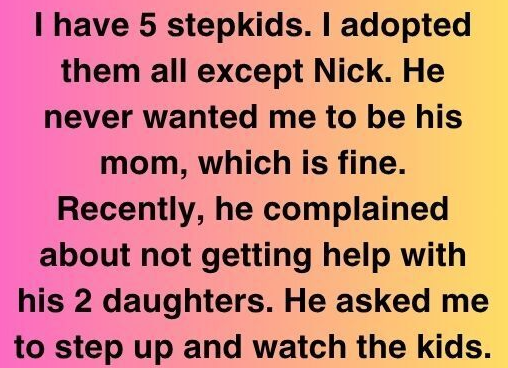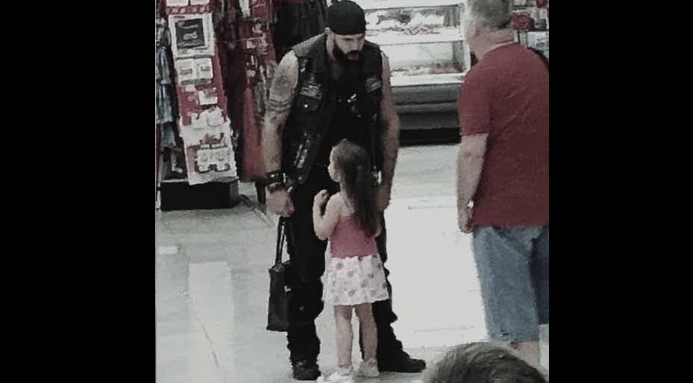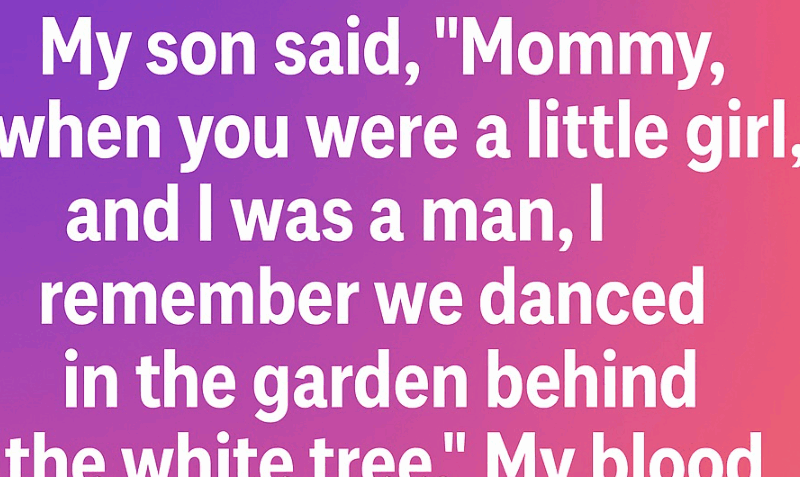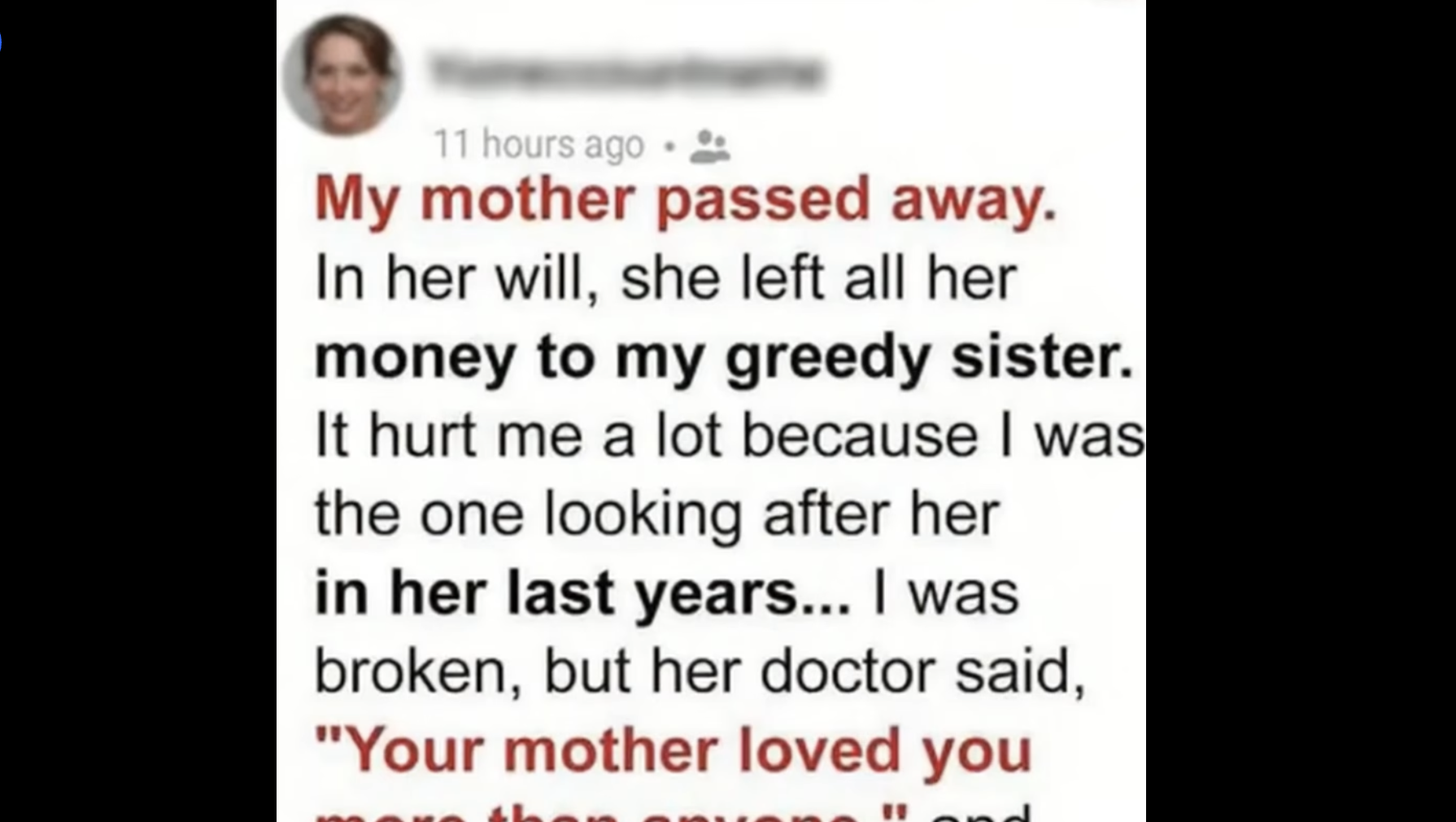I am a mother to five stepchildren, having legally adopted all but one—Nick. He always held firm that I wasn’t his mother, a boundary I respected. Lately, he reached out, voicing frustration over needing support with his two young daughters. He requested that I step in to care for them. I declined, explaining my reasons clearly. His reaction was sharp, accusing me of harboring resentment toward him, claiming I’d been waiting for an opportunity to distance myself.
Those words stung deeply—not because they held truth, but because Nick genuinely believed them. Deep down, I sensed this moment had been brewing for years, built on layers of unspoken misunderstandings. Still, I refused to let him reshape our history to suit his current needs.
I responded, “Nick, I’ve never resented you. But I’ve also never been given the space to care for you as a mother.”
He dismissed it with a scoff, calling it an excuse.
Watching him—worn out, gripping his phone in one hand and his toddler’s sticky backpack in the other—I understood that to him, my words might have sounded hollow. To me, though, they were the weight of nearly two decades of truth.
Let me share the backstory.
I married Nick’s father, Tom, when Nick was eleven. He was the second eldest, carrying a glare that could hush any conversation. From the start, he made it clear I was merely “Dad’s new wife,” not family. The other children gradually opened up to me. I wasn’t flawless, but I poured my heart into earning their trust—baking cakes for birthdays, assisting with school projects, cheering at chilly football games. Over time, they began calling me “Mom.” Nick never did.
I didn’t force it. I believed steady effort would eventually win him over. Instead, he kept his distance—polite at times, but never warm. He skipped our wedding. Family dinners? He only showed if Tom insisted. When I adopted the other children years later, Nick was the sole holdout.
“I have my mom,” he declared.
That was true. His biological mother lived two states away, seen only occasionally, but she held his loyalty. I honored that, even encouraging the others to maintain contact with her, especially early on. For Nick, though, that loyalty built a barrier that excluded me.
Life moved forward, as it does in blended families. We navigated graduations, first jobs, emotional crises, and financial strain. The other children became my anchor. Even after Tom and I parted ways six years ago, they stayed close, visiting for meals, asking me to watch their kids. The “step” label faded with them.
Nick, though, remained aloof. I’d see him at Christmas, sometimes with a girlfriend, often glued to his phone. I never asked why he kept me at bay. Maybe I should have. Maybe we both could’ve done more. But some bonds stay surface-level, and ours never deepened.
So when he called unexpectedly last week, asking me to watch his daughters—ages four and two—while his girlfriend navigated a new job and daycare issues, I was caught off guard.
“Why me?” I asked.
He paused. “You’re great with kids. You raised the others.”
I took a breath. “Nick, I adore your girls. They’re wonderful. But I’m not your mother. I never have been.”
His tone sharpened. “You’ve held onto that all this time, huh?”
“It’s not resentment,” I said. “It’s reality. You set a boundary, and I’ve honored it. Now you want me to cross it when it suits you.”
That’s when he accused me of rejecting him, of waiting for a chance to push him away. I understood—he was overwhelmed. But I couldn’t ignore our history.
After he stormed off, I sat and wept—not from guilt, but from sorrow for what we’d never shared. Then, something unexpected happened.
Two days later, Mya, Nick’s older sister by a year, stopped by. She’s always been my confidante, calling to share work frustrations or swap recipes.
“Mom, can we talk about Nick?” she asked.
I nodded, steeling myself.
“He’s struggling,” she said. “His girlfriend’s drained, they’re arguing constantly, and the girls are a lot. He doesn’t know how to ask for help without it sounding like a command.”
“That’s not my responsibility anymore,” I replied, sharper than intended.
She gave me a knowing look. “I get it. But you know his childhood wasn’t simple.”
“None of theirs was,” I countered.
“I’m not defending him,” she said. “But he’s talked about you over the years. He used to tell me he wanted your advice but felt you’d turn him away.”
That stopped me cold.
“He said that?”
She nodded. “He thought you didn’t want him.”
I swallowed hard. “I wanted him to want me.”
“Maybe you were both waiting for the other to make the first move,” she said. “But someone has to start.”
I mulled that over all night. The next day, I did something bold—I showed up at Nick’s door.
He looked exhausted, one daughter clinging to his leg, the other with yogurt in her hair. His girlfriend, Dani, a kind but frazzled woman, was rushing out with keys in her mouth.
“I can stay for an hour,” I said. “Just so you can shower, nap, or catch your breath.”
His eyes lit up like I’d offered him treasure.
That hour stretched into three. I played with the girls, built block towers, made grilled cheese, tidied up. I didn’t do it for Nick—I did it for his daughters.
Before leaving, I clarified, “This isn’t me stepping back into your life. It’s me showing up for your girls, for now.”
He said little, but a week later, he called to thank me. Then he added something unforgettable.
“I was wrong about you,” he said. “I think I always knew that.”
I held my tears until I hung up.
Months later, the story took another turn. Dani left, overwhelmed and unsupported. Nick was suddenly a single dad, terrified and overwhelmed. And he called me.
This time, he didn’t ask for babysitting. He asked for guidance—to learn what I knew about handling tantrums, cooking affordably, staying grounded under pressure.
I agreed, not out of obligation, but because he was finally letting me in—not as a convenience, but as a maternal figure.
We started small: weekly dinners, park outings, late-night calls when he was at a loss. Nick began showing something new—humility. He offered genuine apologies, not flippant ones, acknowledging how he’d pushed me away and expressing regret.
It wasn’t flawless, and it never will be. But it was authentic.
One evening, after tucking the girls in, he handed me an envelope. Inside was a card that read, Thank you for caring for me when I wouldn’t let you. In his handwriting, he added, “I know you’re not my mom. But I’d like to start calling you that, if you’re okay with it.”
I was speechless. I just hugged him, holding on longer than ever before.
Now, those girls call me Grandma. I pick them up from daycare weekly. Nick brings flowers on Mother’s Day. Our conversations go beyond parenting—we talk about life, pain, and healing. Sometimes, the door you thought was locked forever opens when you least expect it.
Here’s what I’ve come to understand.
Love doesn’t always arrive as you imagine. Sometimes it’s delayed, quiet, or comes from those who once held you at a distance but grow to embrace you. If you’re carrying the weight of a strained connection, I see you. If a door cracks open, even slightly, take a moment. You don’t have to rush in—just peek through.
Healing often starts in those subtle, messy, human moments—when someone says, “I didn’t know how to care for you before. But I’m ready to try now.”
And sometimes, that’s enough to begin anew.
If this story resonated with you, share it with someone close. It might inspire them to open a door they thought was closed forever. If you’ve walked a similar path, I’d love to hear your experience. Leave a like, share your thoughts, and let’s keep spreading hope and second chances.




